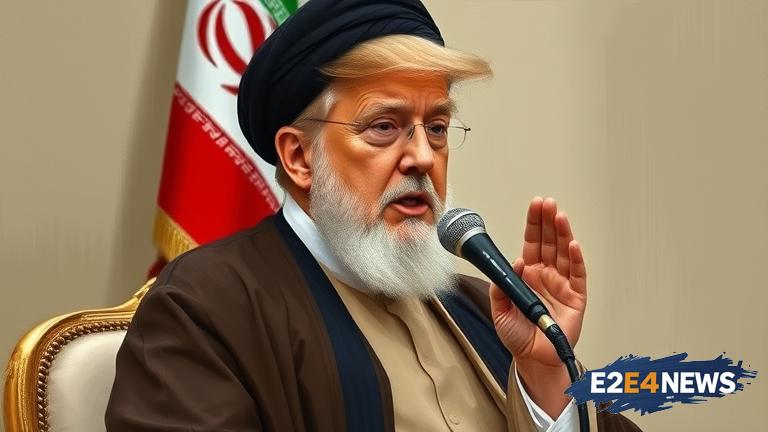Iran’s Supreme Leader Ayatollah Khamenei has recently made a statement accusing US President Donald Trump of seeking obedience from Iran. This statement comes amidst rising tensions between the two nations, with the US imposing sanctions on Iran and pulling out of the Joint Comprehensive Plan of Action (JCPOA) nuclear deal. Ayatollah Khamenei’s comments were made during a speech to a group of Iranian officials, where he emphasized that Iran will not back down to US pressure. He claimed that Trump’s administration is trying to force Iran into submission, but that the Iranian people will not be intimidated. The Supreme Leader also criticized the US for its withdrawal from the JCPOA, stating that it was a clear violation of international law. He emphasized that Iran has always adhered to its commitments under the deal, despite the US’s actions. The tensions between the US and Iran have been escalating in recent months, with the US imposing sanctions on Iranian officials and entities. The US has also been increasing its military presence in the region, with the deployment of additional troops and equipment. Iran has responded by increasing its military capabilities, including the development of new missile systems. The situation has been further complicated by the involvement of other nations, including Europe, which has been trying to salvage the JCPOA. The European Union has been working to establish a mechanism to allow Iran to continue selling oil and accessing the international financial system, despite US sanctions. However, the efforts have been met with resistance from the US, which has been threatening to impose sanctions on any nation that continues to trade with Iran. The situation remains volatile, with both sides refusing to back down. The US has been accusing Iran of supporting terrorism and destabilizing the region, while Iran has been accusing the US of trying to overthrow its government. The conflict has also been having an impact on the global economy, with oil prices rising due to the uncertainty in the region. The international community has been calling for calm and restraint, with many nations urging the US and Iran to engage in diplomatic talks to resolve their differences. However, the prospects for a resolution remain uncertain, with both sides dug in and refusing to compromise. The situation is being closely watched by nations around the world, with many fearing that it could escalate into a full-scale conflict. The US and Iran have a long history of conflict, dating back to the 1979 Iranian Revolution. The two nations have been at odds over a range of issues, including Iran’s nuclear program and its support for militant groups in the region. The current tensions are just the latest chapter in a long and complex conflict. Despite the challenges, there are still hopes that a resolution can be found. Many experts believe that a diplomatic solution is still possible, if both sides are willing to compromise and engage in good-faith negotiations. However, the window for a resolution is rapidly closing, and the situation remains highly volatile. The international community will be watching closely in the coming days and weeks, as the situation continues to unfold. The US and Iran are at a critical juncture, and the choices they make will have far-reaching consequences for the region and the world. The conflict has also been having an impact on the Iranian people, who are suffering under the weight of US sanctions. The sanctions have been causing widespread economic hardship, with many Iranians struggling to access basic necessities like food and medicine. The Iranian government has been trying to mitigate the effects of the sanctions, but it is an uphill battle. The situation is a stark reminder of the human cost of conflict, and the need for nations to work towards peaceful solutions. The US and Iran must find a way to resolve their differences and work towards a more peaceful and stable future. The alternative is a devastating conflict that would have far-reaching consequences for the region and the world.
